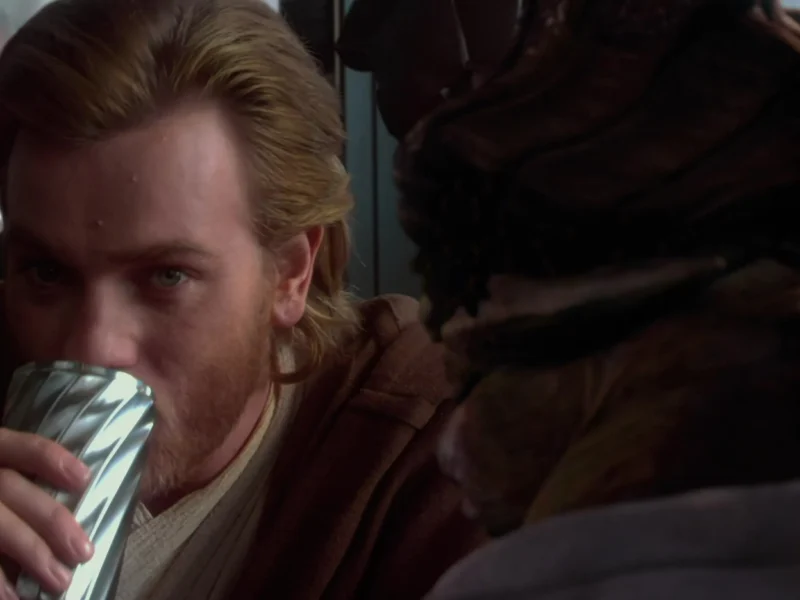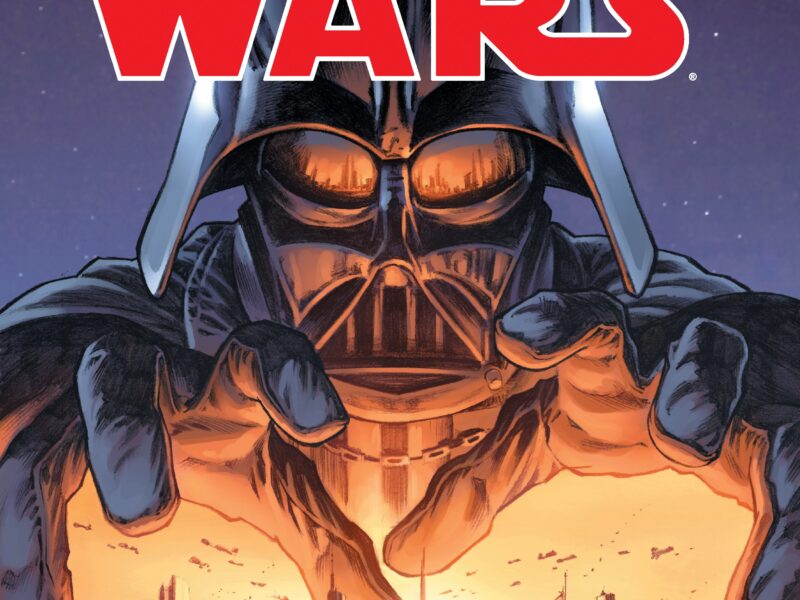For movie box office, one thing that’s not talked about enough is movie studio market share. How many studios are releasing big movies? How many studios get a share of the pie? It’s always fluctuating, but there’s some concerning trends that could really impact the future of movies. And trends that can reassure us that a film apocalypse is not to come.
So, I’ll do a little unscientific case study (sorry Stephen Follows, no science here) and look at five different years for movie studio market share. Look at the top movies, the biggest studios, and try to glean what’s changed and what might continue to change from here on out.
Out front: I’m personally biased heavily in favor of studio diversity. I don’t like conglomeration centralization in any medium, and it’s gotten worse in nearly every medium. Video games, in particular, have centralized massively in the last 15 years, while music, books, and TV/movies have lost one or more of their Big Five (or four…). I’m not a studio fandom person or whatever, but it’s very good to see more companies taking a crack, even if it doesn’t last.
Also: These rankings don’t cover streaming movies. Obviously, movie studio market share won’t capture that, since there’s no box office. But just know, there’s a healthier slate of movies from Amazon Prime, Hulu (Disney/Comcast), Netflix, Apple TV+, and Roku in addition to the major studios.
OK, let’s get on with the case study. My data comes from The Numbers, the best movie box office site.
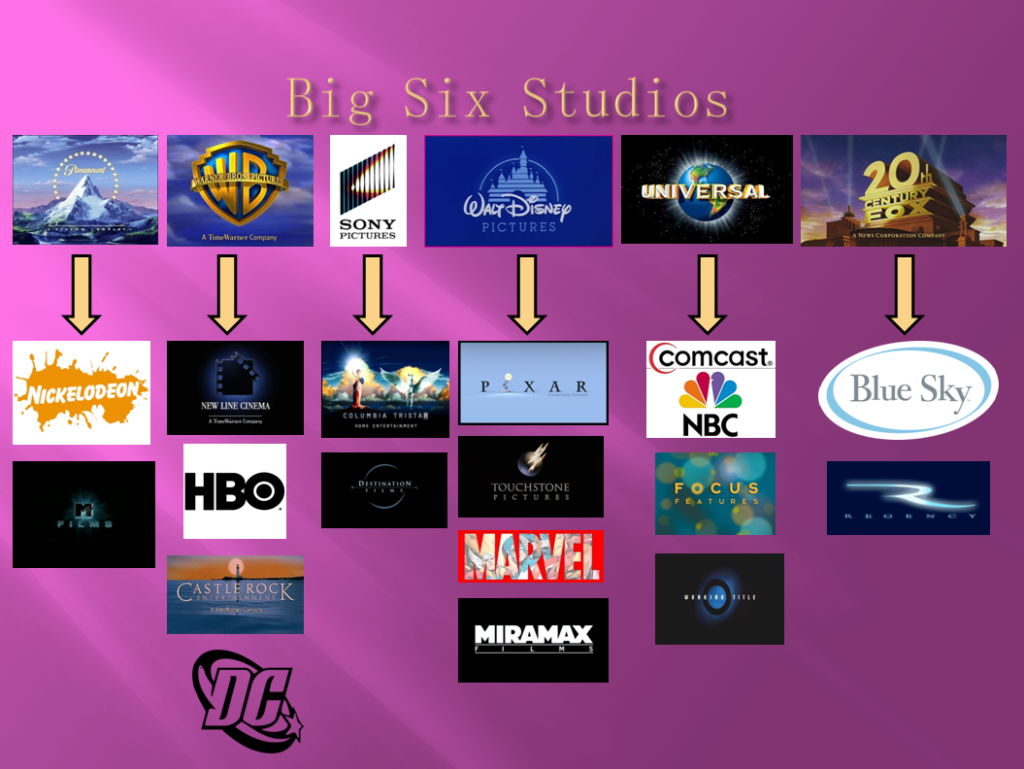
Movie Studio Market Share Case Study #1 – 1995
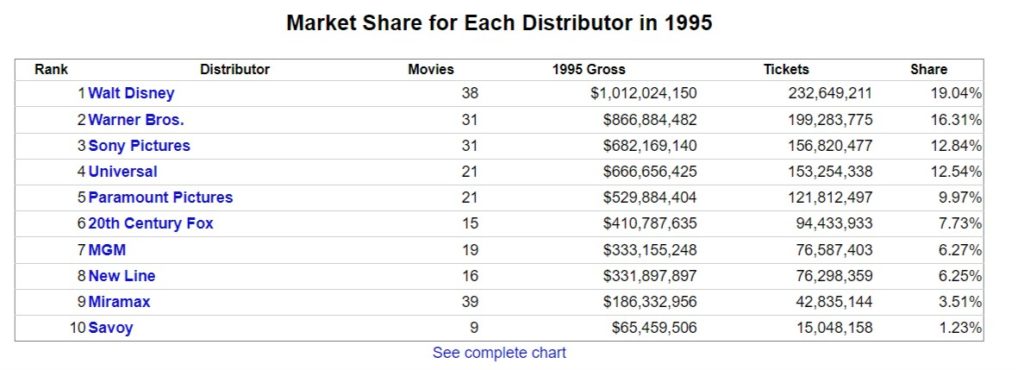

1995, the height of movie tie-in madness. Crappy licensed video games. Toys out the wazoo. Tie-in cartoons, franchise revivals. This was a year where Seal’s song “Kiss From a Rose” could headline the Batman Forever soundtrack and become a smash-hit single.
Out of these top 10, four are sequels, and Casper is an adaptation. Apollo 13’s a big-budget historical drama, Pocahontas is an ill-advised Disney Princess musical, and Crimson Tide is a Hunt for Red October cash-in. Waterworld, one of the biggest-budget flops of all-time, “only” sold 20 million tickets. That’s really good numbers compared to movies today, but it didn’t come anywhere near making back its budget. Luckily, worldwide numbers were much better. And so Waterworld became a Universal theme park staple for years to come…
It’s very interesting to see Disney at top; we forget how heavy they went on Touchstone Pictures, their adult-focused imprint. Their Walt Disney brand 90s output was all animation and crappy family films, but with Touchstone they did a lot. Crimson Tide, yes, but also Dangerous Minds, Judge Dredd, and Nixon. R-rated dramas and action movies and romance and all that. They also released an incredible 39 films, which as you’ll see is WAY different than the Disney of today. Just firing off on all cylinders. You just WISH they did that same thing with Fox, but as I ranted about before, they don’t care anymore.
It’s a bit unbalanced, too; only five studios at or above 10%. That’s not good movie studio market share! I like total indie studios like Miramax and Savoy (WTF is that) getting up there, at least.
Eight studios above 50 million tickets sold; that’s another benchmark I’ll judge the rest by.
And another one, 169 movies at 1 million tickets sold or more. These are the three criteria I’ll judge Moviegoing Health by.
How healthy will the other four sample years be?
Next, 2002
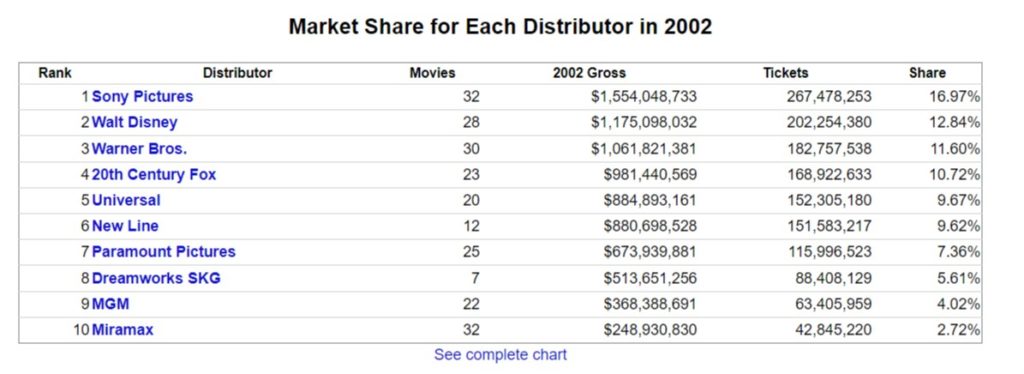
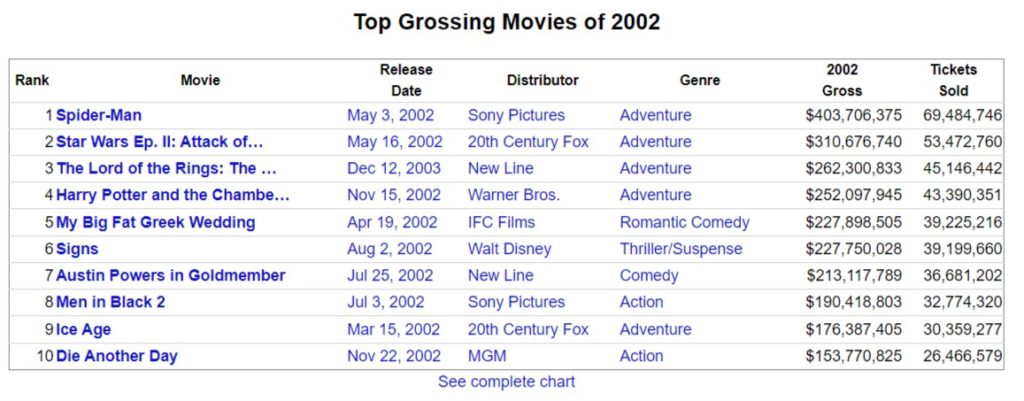
Adjusted for inflation, 2002 is the peak year for movie theaters. About $16 billion! Every year since has had fewer moviegoers. Premium theaters and rising ticket prices are the only thing keeping more recent years competitive. That’s sad.
2002 is also the year of the 2. Star Wars Episode 2, Lord of the Rings 2, Harry Potter 2, Men in Black 2, Santa Clause 2, Blade 2, Spy Kids 2, Stuart Little 2, James Bond 20, Austin Powers…. 2+1…. Damn, and people complain about sequelitis today!
What a good year, though. Well, if you’re really into diverse original movies, maybe not. But the top four movies today are all classics (yeah even Attack of the Clones, haters) and there’s so many blockbusters we fondly remember today… And not-so-fondly but still, we actually remember them.
As for moviegoing health,
Six studios at or above 10% market share (yes I’ll round up, I’m generous). That’s pretty nice. New Line was part of Warner Bros. by 2002 though, so secretly it’s only five. Nine studios at 50 million tickets or more. And 169 movies at or above 1 million tickets sold.
As a nice little note, I’m glad to see My Big Fat Wedding so high up, but IFC nowhere on the rankings. They were and still are a tiny little indie studio, who got immensely lucky off one of the biggest surprise hits of all-time. They weren’t in the Top 10 studios of the year, though, which means there’s a good studio diversity; it’s not healthy to have a single movie make or break the rankings.
But 2002’s essentially unchanged from 1995. Dreamworks butted in there, briefly, but other than that it’s almost exactly the same. 2002 was the peak because it got extremely lucky off mega-hit franchise films, but other than that it’s the same as always.
Let’s skip forward a little…
2010 Movie Studio Market Share
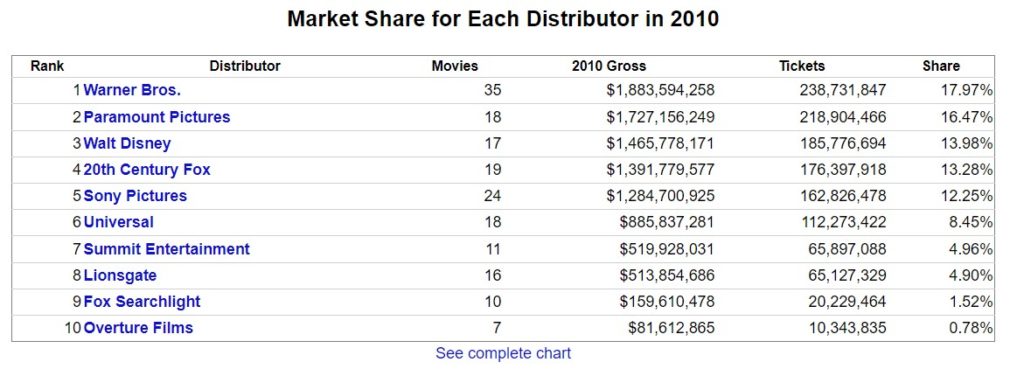
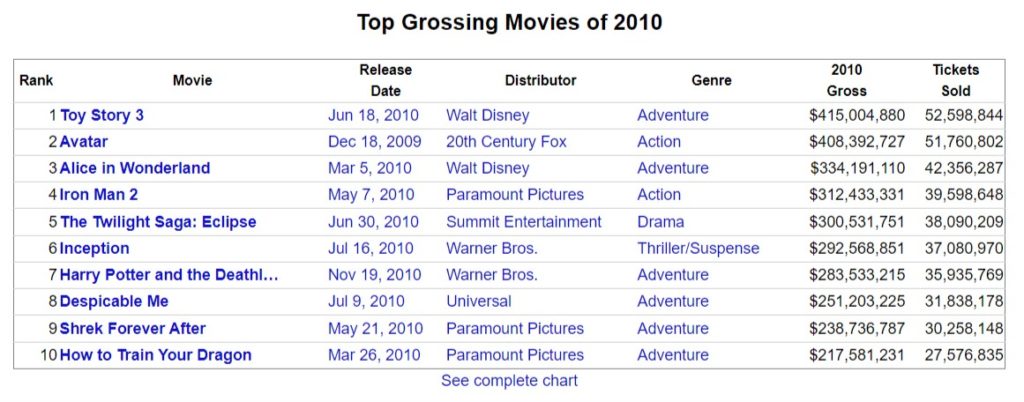
I chose 2010 because it’s a very important transition. The first year where 3D movies were widely available. The final year before the onslaught of MCU and DC and X-Men and Sony superhero movies every year. (2010 itself had two superhero movies, Iron Man 2 and… lol Jonah Hex… but 2012 had four, and 2016 had eight…)
With that in mind, we see even more franchise films than ever. Five sequels, one Disney animated reboot, and one kid’s book adaptation. We got three pure original huge hits, though, so I can’t fault it. Avatar’s 2010 holdover, Inception, and Despicable Me is a really really good track record–also I’m legitimately surprised WB never managed to milk another Inception out and give it to Josh Trank or something with Nolan angrily executive producing.
As for moviegoing health, five movie studios above 10%. Then eight studios with 50 million tickets sold. And then 145 movies with 1 million tickets sold or more. MGM and Miramax died, New Line got absorbed into WB, Dreamworks gave up on being a major studio (Paramount released its movies), and two mini-majors stepped up–Lionsgate and Summit. The two would merge in 2012, which nearly made Lionsgate a new major studio, but it’s floundered real bad in the post-pandemic era.
I have no idea what Overture Studios is.
Yeah, eight studios passed the 50 million tickets benchmark, but DAMN that drop-off is steep. Eight studios doing nice, and then straight down to arthouse and indie.
Also, WB released a whopping 35 films in 2010! What the hell! Everyone else is like 15 or 20, and then WB’s out here picking up all the slack, almost a movie every week. We should give them more credit for that. Their movie studio market share matches their insane output.
2019’s Movies
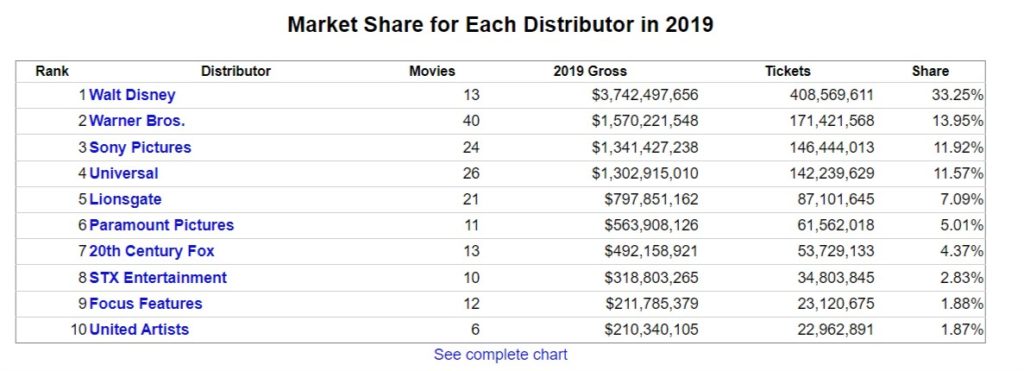
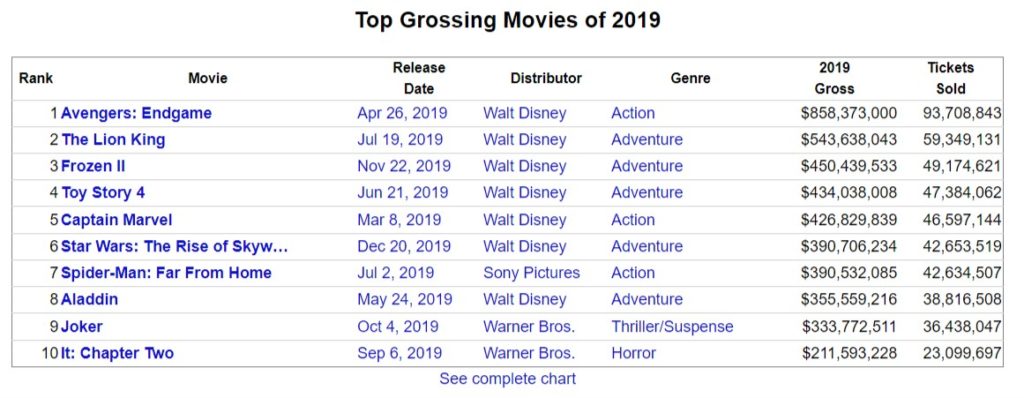
Here’s the final pre-pandemic year. The last year where theatergoing was “normal.” It still hasn’t recovered fully…
Holy shit WB released 40 movies in 2019?! I do NOT remember this. Wait, eight of them are classic movie re-releases. Still, 32 movies is real nice. (For the record, they had only one re-release in 2010, The Exorcist.)
Also, that “United Artists” there is secretly the return of MGM. They slowly cobbled together a return using different distribution arms–United Artists, Annapurna, and MGM proper. Together, they made about $260 million and sold about 27 million tickets. It’s a special case from the other studios that might have separate arthouse studios–but it doesn’t change the situation much. They got bought by Amazon recently, so that’s all been absorbed together. Well, I’m not sure about Annapurna but they aren’t distributing movies anymore, anyway. MGM is back, sort of.
Disney purchased Fox in early 2019, which is why Fox had such a big downturn here. You’d think Disney would be releasing tons of movies now thanks to that… And you’d be wrong, because they only released 13 (10 not counting holdovers from 2018). Every case study year, their movie studio market share has been similar. But their film output has decreased. More than any other studio, Disney exemplifies the death of small and mid-budget movies in favor of giant blockbusters–and it paid off in 2019 with a whopping 33% market share! We will probably never see anything like that again. Thankfully?
Lionsgate had cemented its place as a major studio–at least until March 2020 ruined everything–while Paramount was in an extremely bad place. They’ve recovered a lot since 2019, but not as much as you’d hope. Even after re-absorbing CBS in late 2019 (CBS Films were released through Lionsgate from 2014-2020), it didn’t help them take up from where Fox disappeared.
As for moviegoing health, only 4 studios above 10% (thanks to Disney). There’s 7 studios that sold 50 millon tickets–Fox just barely. And 137 movies above 1 million tickets sold. That last one is a decline from 1995 and 2002, for sure, but not too much. I’m actually surprised that it stayed that high; a healthy stream of indie movies probably helped that a lot–A24 and Neon both did great. And this was a big year for minor studios like STX, Aviron, Entertainment Studios and MGM to do their thing.
2019 was designed on purpose to be Disney’s crowning jewel. 7 of the top 10 movies were Disney. 9 non-documentary Disney movies came out in 2019, and all 9 grossed over $100 million domestic. 7 of them grossed over $350 million! That’s absolutely massive! And then Sony’s only big movie was Spider-Man, basically a Disney movie too. Four of the top ten were superhero movies, ALL TEN were sequels or remakes. It’s 2002 all over again, damn.
We know what happened next. Let’s skip ahead to 2023 and see what’s changed since the pandemic. Since every major studio except Sony launched their own streaming service (even Lionsgate has Lionsgate+ lol). Since the stock market downturn that’s led to lots of layoffs.
2023 Movie Studio Market Share (as of 11/20/2023)
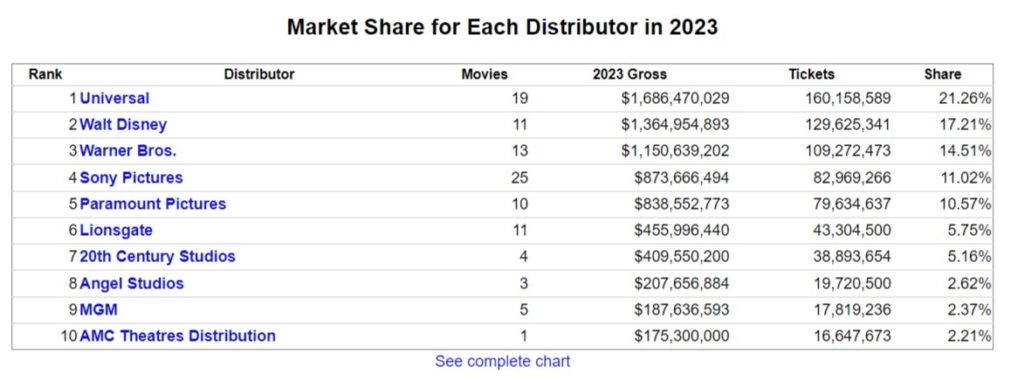
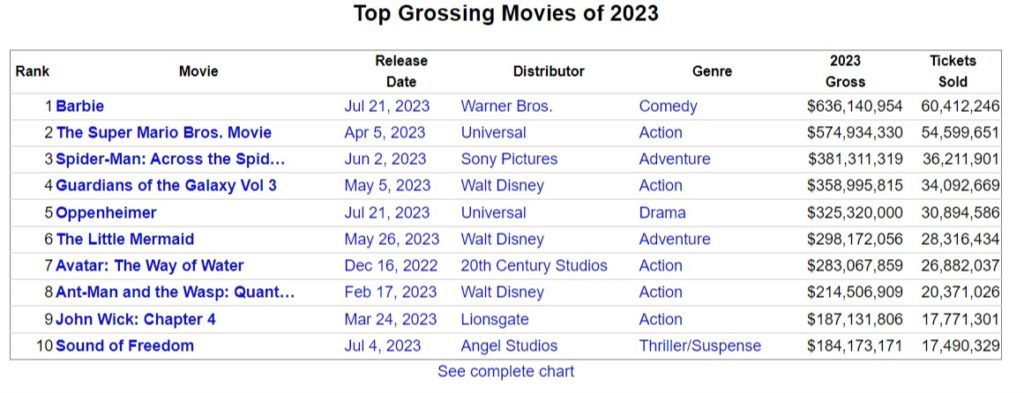
Well… It’s less sequels and remakes, I guess…
Big caveat here, the year isn’t over yet. Disney’s Wish, and WB’s Aquaman 2, The Color Purple and Wonka all have decent chances of reaching the Top 10. Warner Bros. will most likely take the #2 spot by the end, unless all three of their remaining movies flop hard. Honestly, it’s possible.
I’m praying hard for Godzilla -1.0 and Boy and the Heron. Two Japanese releases scheduled for December, released by indie studios and up against the worst Christmas season I’ve ever seen for the box office. Holy crap, this is looking dire. Everyone fled the might of Aquaman 2, but then Aquaman 2 got such bad buzz I’m not sure it’ll even reach $150 million… Please, please let a small movie break out big. Anything.
Anyway, besides that, 2023 exposes a very big hole. As you can see, the Top 10 movies are MUCH lower in tickets sold than every other year. Other years, the #10 movie sold about 25 million tickets. That’s the same as the #6 here. Three superhero movies. Six sequels or remakes. Two brand IP films. Sound of Freedom and Oppenheimer are genuinely shocking surprises, and Taylor Swift down in #11 is too. But four years out, and nature still hasn’t healed from the 2019 Disney juggernaut; everything here’s adopting the same model.
Anyway, for moviegoing health… Five studios at 10% or more, but a massive drop-off after there. Similarly, 5 studios who have sold 50 million tickets or more; Lionsgate has a GOOD chance to break the barrier, but it requires their final film of the year, Silent Night, to make something like $50 million, or for the Hunger Games prequel to end up at around $120 million. They both have to do decently.
And the final sucker-punch… just 84 movies that sold 1 million tickets or more.
Don’t get me wrong, I’m glad we’re getting so many movies on streaming that the other studios wouldn’t fund. Nimona only got released thanks to Netflix, and Apple TV+ is handing us two major adult-focused blockbusters with Killers of the Flower Moon and Napoleon. But in a span of 13 years, we lost nearly HALF the films that can sell a million tickets! It’ll increase the rest of the year, but it’ll be more like 98 or 99 total, not 135. I hope I’m wrong.
Troubling Trends
Superhero movies aren’t doing as well anymore. Aside from Guardians of the Galaxy 3 and Spider-Verse 2, every superhero movie of the year has flopped or disappointed. 2/8… that’s a 75% failure rate! They were a huge factor in 2019, but not in 2023, and the market hasn’t adjusted for it yet.
The studio diversity is also very concerning. Combine 20th Century Studios into Disney, and the Top 5 make up almost 90% movie studio market share. The mini-majors and ambitious indies like Lionsgate, STX, A24, Neon, and the like are struggling, while MGM got kneecapped by the Amazon buyout. Paramount still hasn’t recovered from whatever mysterious illness beset it in the late 10s, and so many of its breakout critical hits flopped overseas. That’s not good at all.
Disney is struggling with gigantic budgets, where Indiana Jones 5 cost a gargantuan $300 million, while The Marvels cost $275 million. Both will lose the company hundreds of millions each and legitimately risk killing off the studio if this keeps up. They HAVE to get budgets down.
Reassuring Sameness
But, overall, things haven’t changed THAT much. We still get original breakouts every year. There’s still 5-6 studios doing okay and a couple smaller ones doing their best. There’s still way too many sequels and remakes and reboots.
Now that the streamers have proven to be huge money-losers, we’ll probably see more and more movies get theatrical releases again. Some streamer film like American Pickle might actually get released just to fill the gap. The lack of major ticket sale change is reassuring. It’s down a lot from 2002, but not enough to panic about. Not yet, anyway.
How Will 2024 Go?
The big strikes this year meant that so many big blockbusters got delayed into 2025. There’s now not one MCU movie releasing next year, holy crap. Not one DC film–oh wait sadly Joker 2 is coming, ugh. There’s three Sony Marvel movies for some inexplicable reason but they’re lower-key releases so there isn’t the same pressure. Also Deadpool 3 which I’m not sure about at all; it’s a wild card because its predecessors were huge hits critically and commercially, but it’s at a new studio with totally different priorities. Okay, that’s five supehero movies, so we’re still gonna have a lot.
This all means, though, that we are going to potentially have a year more like 2010 than 2019. Less sequels, less superhero stuff. And with studios desperate to release content, we are very likely to see more indie stuff promoted to major release, more foreign films, more anime. It could be a really good year for smaller movies to break out, for unexpected smash hits.
My money’s on The Fall Guy releasing early May; it’s a David Leitch action movie starring Ryan Gosling and Emily Blunt, with no franchise hook. I think that one will come out of nowhere and make a bazillion dollars. I trust in 87Eleven (87North? IDFK)!
Conclusion to Movie Studio Market Share
Don’t worry so much about all this stuff, really. Conglomerates merge a bunch, then they fail and break apart, then new companies innovate around them until they get gobbled up into the conglomerates and the whole cycle repeats.
It feels hopeless now, like we’re headed into the inevitable Mega Corporation Cyberpunk World, but… nah. Disney struggling bad in 2023 is proof enough that that just won’t happen. Capitalism’s too weird to let it happen. In media, specifically. In tech, very much it’s happening, please break up Amazon and Google.


